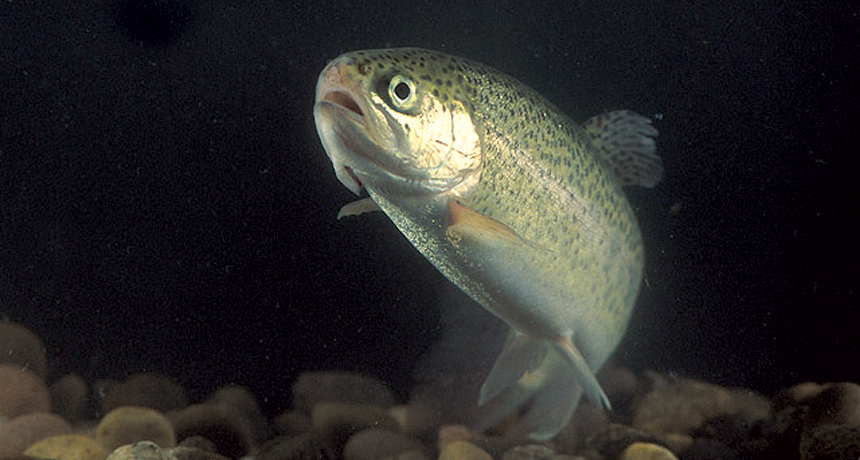Don’t mess with a frustrated fish
Annoyed little trout fight, and sometimes fend off, bigger fish

Rainbow trout, like the one pictured here, have a temper. When they don't get the snack they were expecting, the fish get aggressive.
Researchers have found a way to unleash the fury of a rainbow trout: Withhold a treat. In recent experiments, when these fish didn’t get the snack they expected, they turned feisty — and got into violent fights.
The snack in question was a bit of shrimp. And when small trout were denied the shrimp, they became willing to fight bigger fish, ones they normally would have fled, reports Marco Vindas. A biologist at the University of Oslo in Norway, his team showed that in two of 11 cases, small fish were even able to defeat bigger ones. The researchers described their findings April 23 in the Proceedings of the Royal Society B.
So why tease fish in the first place? Studying fish fights can help scientists better understand the connection between behavior and brain chemistry, Vindas told Science News.
Other studies had shown that birds and mammals may become more aggressive when they’re denied snacks. But scientists didn’t know if fish brains would experience the same frustration. In one earlier study, Vindas teased Atlantic salmon. He training them to expect snacks — and then sometimes withheld them. In these tests, fish were studied in groups, not in staged, one-on-one fights. And here, when denied snacks, those salmon became agitated.
In the new study, Vindas and his colleagues focused on rainbow trout. In addition to feeding the fish regular meals, the scientists taught these fish to expect a snack of shrimp bits whenever a light flashed. To trout, Vindas explained, shrimp is “like candy.”
Then the researchers paired each of 11 small fish with a bigger one. A smaller fish usually will flee from the bigger ones or quickly surrender to it. And that’s mostly what happened when the big and small fish both received their snacks. The big fish threatened the smaller guy, who then took off.
But when these trout saw a flash of light — but didn’t get a snack — their fights got more heated. And the little ones fought back against the bigger fish; they no longer seemed eager to give up. In fact, the little fish made moves as if they were actually dangerous, Vindas told Science News. For instance, the little fish flared their fins and gaped their mouths.
Trout sometimes kill each other in fights, but normally one fish gives up and swims away. And eventually, that’s what happened in the new experiments: No fish died. But in two of the 11 fish fights, it was the bigger fish that turned tail and swam away.
Biologist Ryan Earley studies fish fights at the University of Alabama in Tuscaloosa. He told Science News that the new study by Vindas’ group suggests something interesting is happening inside the brains of frustrated fish. The researchers found high levels of the chemical serotonin in one part of the fish’s brain. And that may turn out to be related to the increased aggression.
Power Words
behavior The way a person or animal acts towards others, or conducts itself.
biology The study of living things. The scientists who study them are known as biologists.
serotonin A chemical present in blood that constricts blood vessels and communicates signals in the brain and nervous system.







